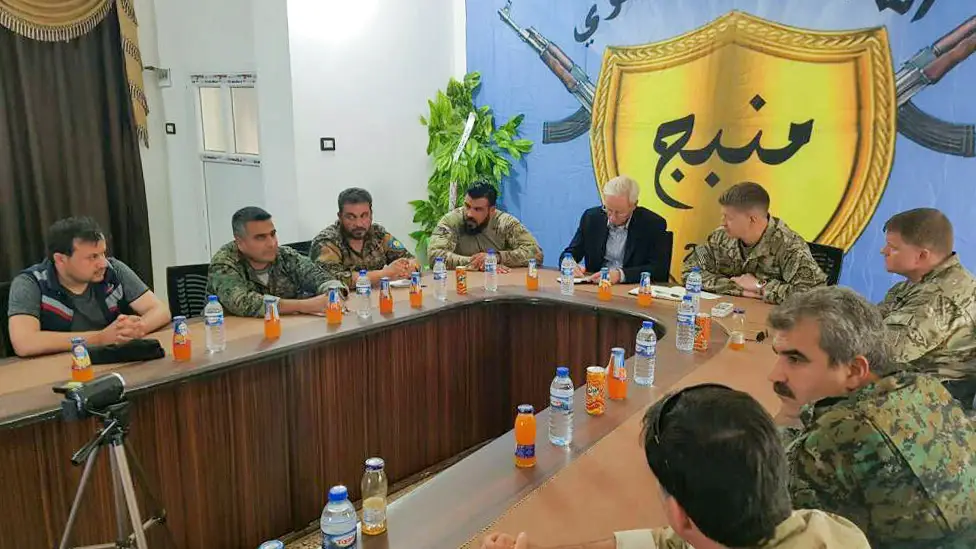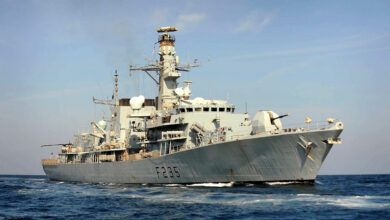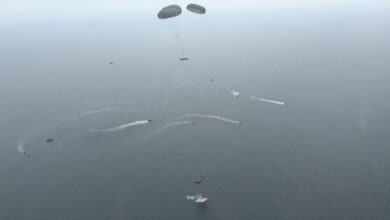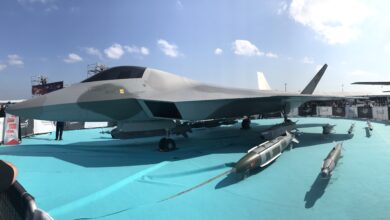US gave guarantees to protect Manbij after Turkey deal, MMC spokesperson says
Shervan Derwish says Manbij Military Council will have final say over any proposed changes to local security structures
Updated June 8
The United States and Coalition against Islamic State have pledged to protect the northern Syrian city of Manbij from outside attacks, according to the spokesperson for Manbij Military Council, which provides security for the city.
Following the announcement on Monday of a joint U.S.-Turkey ‘roadmap’ for the future of Manbij, representatives from Combined Joint Task Force – Operation Inherent Resolve and the U.S. Department of State have met with Manbij Military Council to give concrete assurances that the U.S. and Coalition will protect the city.
“We got assurances from the Americans [and] the Coalition,” MMC spokesperson Shervan Derwish told The Defense Post on Friday, June 8.
“They [said] in that assurance that Manbij is one of the safest areas in Syria. ‘We will help to preserve this safety in Manbij. We will keep it safe by our existence in Manbij, and protect it from other attacks,’ [they wrote]. So Manbij Military Council got assurances about protecting Manbij from outside attacks.”
A spokesperson for CJTF-OIR referred a request for comment to the U.S. Department of State.
A State Department official told The Defense Post: “As we have said, the implementation of the road map will be based on the conditions on the ground in a phase by phase approach. We are committed to a sustainable long-term arrangement in Manbij that ensures stability and security, while also addressing Turkey’s concerns. Further details of that arrangement will be determined during the implementation process. I have nothing further to offer on diplomatic discussions regarding this ongoing process.”
https://twitter.com/shervanderwish/status/997593325841649665
Manbij was captured from Islamic State on August 12, 2016 by the U.S.-backed Syrian Democratic Forces after a 75-day battle, later named “Operation Martyr and Commander Faysal Abu Layla” after the SDF commander. Fighters from the People’s Protection Units (YPG) and Women’s Protection Units (YPJ) made up the bulk of those deployed in the operation, and the YPG said it handed its points of control west of the Euphrates river to MMC as it had agreed ahead of the offensive. Turkey has long disputed this version of events, while the YPG said on Tuesday some of its forces had remained to advise MMC.

“We fought for all of humanity. We paid a lot to defeat ISIS in this area and in Syria so we are hopeful to find a political solution. We are hopeful to find a political solution – [because] we paid a lot in bloodshed – so our blood doesn’t go in vain. We are hopeful to find a political solution – we hope the civilized world will help us to prevail safety in the whole of Syria,” Derwish said through a translator.
The mainly Kurdish YPG makes up the backbone of the SDF, but Turkey sees the group and its political arm, the Democratic Union Party (PYD), as terrorists inextricably linked to the outlawed Turkish Kurdistan Workers’ Party (PKK).
The YPG announced on Tuesday that it was pulling those remaining advisors from Manbij.
“Manbij Military Council is significantly – significant majority Arab and local, and so obviously, critical elements of those structures we would anticipate would remain in place, and we’ll work this through with the Turks to make sure that they are comfortable with the long-term arrangements, as has been laid out in the roadmap,” a State Department official said in a teleconference with reporters on Tuesday.
Manbij has “been a stable area and the agreement is to keep it that way,” the official said.
The State Department said that the YPG cadres would be “replaced by locals who are mutually agreeable” to the U.S. and Turkey, but also presumably to the local population.
Derwish said on Friday that the MMC would have a say in who is part of the council.
“Of course we will have a say and nobody will be added to this council without our approval because we are the citizens, we are the sons of Manbij city who liberated Manbij. We paid a lot of our sons and young people to liberate this city from terrorism,” he said.
In contrast to Manbij, the areas of Syria now controlled by Turkey or Turkey-backed Syrian rebels, such as Azaz and Al Bab, are not stable, he added.
“We were successful [in stabilizing] the city [of] Manbij. If you see Turkish or rebel controlled areas, there is looting, there is killing. Each side is fighting the other side, so there is no stabilization. Now we see Turkey prepared to come here. Nothing on the ground happened [but] they are fighting [about] who will have regulations. In Jarabulus the rebels are fighting about the regulations, who will have regulations in Manbij. People here in Manbij, they know about these things. They see what is happening in Bab, what’s happening in Azaz, so the people here really refuse for the Turkish army or FSA [elements] to come to Manbij.”
‘Blood brothers’ in the fight against ISIS
“I believe the Americans when they say that they have the Manbij Military Council’s back,” said Nicholas A. Heras, Middle East Security Fellow at the Center for a New American Security. “The fact of the matter is that the U.S. military, especially American special forces operators, view the Manbij Military Council as blood brothers who fought hard against ISIS and stayed true to their word that they would provide good security for their home areas once ISIS was beaten.”
The Trump administration is operating under the assumption that the U.S. will have pulled all its forces out of Syria by the end of the year, although there are a few different ways that process could be staged, including by a phased drawdown that buys more time for the SDF to continue to build security infrastructure, giving it more leverage with the Assad government and to prevent the return of ISIS, he added.
“The question is how will the Americans stage their withdrawal in a way that protects the Manbij Military Council, and the larger SDF, and maximizes its leverage on the future of its home areas? Donald Trump has that answer, and depending on how Americans vote this fall, and the North Korea talks go this summer and fall, he might not need a foreign policy ‘Win’ that would hasten the U.S. departure from Syria.”
Assassinations of local leaders
Although Manbij is rapidly becoming a more stable place, two Coalition personnel were killed in a March 29 car bomb explosion in the city that was later blamed on ISIS. Five others were injured.
Several senior MMC figures have also been the target of assassination. On March 23, Darwish was injured in an attack on the road between Manbij and Aleppo, and in November, a bomb exploded in a car belonging to Muhammad Abu Adel, the MMC commander. Although injured, Adel survived the attack. Both incidents were claimed or blamed on groups linked to Turkey.
“At any [time] I am exposed to assassination attempts because we have many sides who are against our project,” Derwish told The Defense Post.
The project, the Democratic Federation of Northern Syria, includes the territory captured by the SDF from ISIS, including Raqqa and Tabqa. Self-declared in 2016, the DFNS is based on the bottom-up democratic confederalism model, where decisions are taken at a local level by local people.
This model is repeated in areas that traditionally make up or ‘Rojava,’ the Kurdish word for ‘west,’ which refers to the areas of Kurdistan that fall within Syria.
The DFNS has, for example, strict rules on female, ethnic and religious representation, ensuring that all voices are heard. It has, however, been the focus of criticism for the real or perceived control of its structures by the mainly Kurdish PYD, and because it is based on the political philosophy espoused by jailed PKK leader Abdullah Ocalan.

The group that tried to kill him, Harakat al-Qiyam, is related to Turkish intelligence, Derwish said. Formed in the second half of 2017, the relatively small armed group is active in SDF-held areas of eastern Aleppo and Raqqa provinces, and has carried out a number of attacks on YPG- and SDF-linked individuals since October.
“We have enemies from many sides. We have a lot of sides that are against our project here. I devoted my life to Manbij, to those people, so my blood is not more expensive than other martyrs like Abu Amjad and Faisal Abu Layla.”
“When they target anybody in Manbij Military Council, this is are not targeting people in name. They are targeting people because our project is the most successful project. That’s why they are targeting us – they are targeting the project, not the people, not the person,” he added.
Adnan Abu Amjad, a native of Manbij, was the MMC commander when he was killed fighting with the SDF in the battle for Raqqa. The SDF announced his death on June 30, 2017. Abu Layla, the SDF commander and leader of Shams ash-Shamal, was shot in the head by an ISIS sniper on June 3, 2016 and died two days later during the Manbij offensive.
In March, Omar Alloush, the co-head of Raqqa Civil Council’s Public Relations Committee and a member of the Syrian Democratic Council, was murdered in his home in Tal Abyad, prompting senior Kurdish officials to blame Turkey, saying Ankara wanted to destroy the multi-ethnic DFNS.
A month earlier, Ibrahim Salama, the lawyer responsible for negotiations between the SDF and Islamic State in Raqqa which led to ISIS fighters leaving the city, was shot and killed at his home in Tabqa.
“We have some projects with the Coalition, with civil stabilization institutions. We [will] have projects in the future so we can find solutions for these assassination attempts,” Derwish said.
Continued US and French presence in Manbij
CJTF-OIR spokesperson Colonel Thomas Veale said on Tuesday that there was “no immediate plan” to change the footprint of U.S. troops on the ground in Syria.
A source familiar with Coalition operations in Syria previously told The Defense Post that the Americans and French began high-ranking visits to Manbij earlier this year after Turkey rejected a U.S. offer during the first phase of negotiations.
But both State Department officials on Tuesday’s press call stressed that there was no plan for a long-term U.S. or Turkish occupation of Manbij.

“The idea behind this is not for the U.S. or Turkey to take over Manbij. The idea is for the people of Manbij to reassert their leadership over both governance and security structures there,” one of the officials said.
MMC has outright rejected the deployment of Turkish soldiers to Manbij, with Derwish saying this week that MMC was capable of maintaining security in the city, and accused Turkey of disrupting peace in the region.
“We will not accept that,” he told Reuters on Wednesday when asked about a Turkish military presence in Manbij.
“There is also still the possibility that the U.S. will make an arrangement with regional partner countries, Arab states including Saudi Arabia, the UAE, and Jordan, and other Coalition partners, such as the Europeans led by France, to maintain a small advisor presence on the ground to support the SDF and its adjutant branches such as the Manbij Military Council,” CNAS’s Heras said.
“The Emiratis and Jordanians are already on the ground working to build up the Arab components of the SDF and word on the street is that these close U.S. Arab partner countries might be subsidized to stay in Syria for a longer period of time beyond the American presence.”
Derwish said the MMC had met with France and the other Coalition forces since the roadmap announcement.
“Of course we make regular meetings with the French and the other partners who are fighting under the umbrella of the Coalition,” he told The Defense Post.
“We don’t think that the U.S. or the Coalition will leave Manbij in the near future because if USA leaves Manbij this will be a reason for ISIS to come back again.”
This story was updated immediately after publication. Mr. Derwish contacted us on Friday, June 8 and said that the U.S. delegation did not give MMC written guarantees, and said there may have been an error by his translator. We have updated the story, including quotes, to remove all references to ‘written’ assurances.












